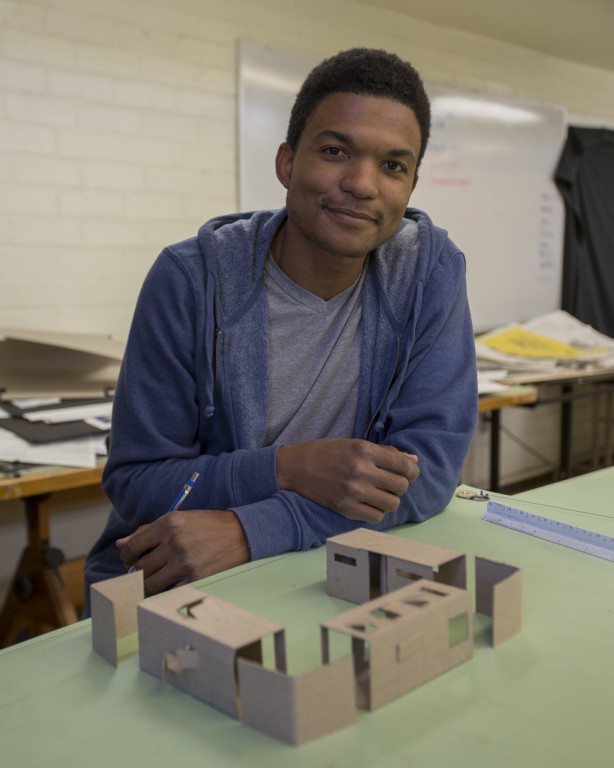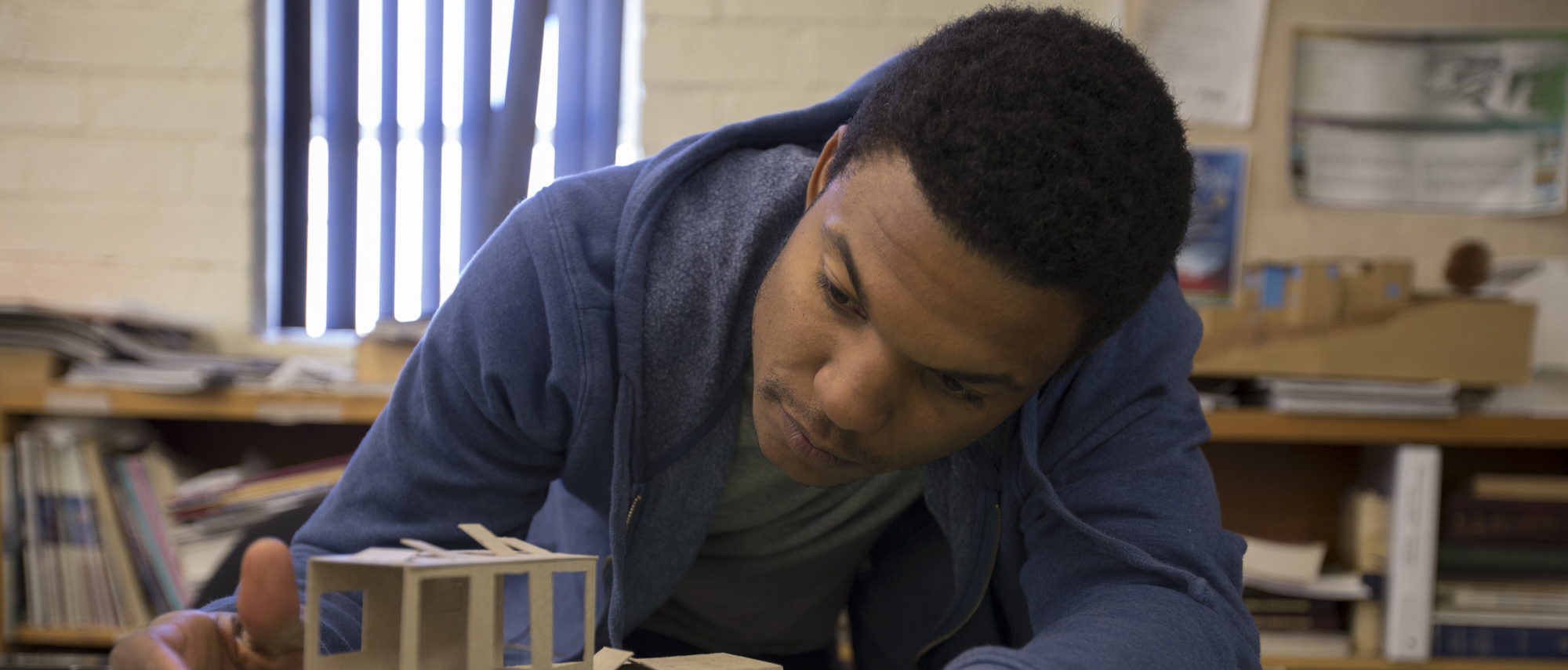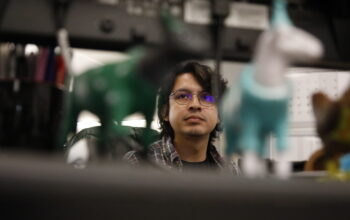
The demands of balancing parenthood with full-time school and an acting career can be a handful at times. However, for Rudolph “Rudy” McCollum, 39, it is a welcomed slow of pace.
McCollum was born in Long Beach, California, but experienced a nomadic childhood. Before moving to Los Angeles when he was 19, McCollum had lived in Northridge and Compton.
The force that drove McCollum to LA was his dream of pursuing a career in acting. He credits his father, Robert McCollum, with igniting this passion.
“As a child I would accompany him to his classes that were in Hollywood, and I would walk up and down the street, and look at the [Hollywood] stars,” McCollum said. “Being a native in Los Angeles, it kinda pulls you in.”
The first part McCollum landed was a television spot while he was still in junior high.
“I got invited to an audition by a friend who was already in that business,” McCollum said. “It was a commercial for a television show called ‘Pump It Up,’ which was L.A.’s first hip-hop TV show.”
Despite this, McCollum did not take acting seriously until he began performing with his father.
McCollum briefly attended Pierce College to study Japanese. In 1999, he met his wife, Yuko Morikawa, who was studying dance in Granada Hills.
Morikawa grew up in Sapporo, Japan, but moved to California for school. She now works as a pastry chef at Neuehouse patissiere in Hollywood, Ca.
McCollum remembered how when first he saw his wife, he saw the face of their future daughter, before they even started dating.
In 2006, the couple and their children moved to Japan where McCollum taught English to over 4,000 students whose ages varied from 2 to 75 years old.
While he knew teaching in Japan to be different than teaching in the U.S., McCollum was surprised by how stark the contrast was. Most notable was how he did not need a teaching degree because it was not a requirement.
“During that time [in 2006] you could just show up and teach what you know out of the [English] textbook,” McCollum said. “Being a native speaker, we do have some degree of experience with the language. But I think the rules have changed now; I believe they’re much more strict.”
McCollum called the Japanese instruction system “English Engineering because of how copy and paste” it felt. The severity of detachment between the teachers and their class was evident in the way the two would interact.
“English in Japan is like a business. In a way, it makes me wonder if they are learning,” McCollum said. “You just come in, you teach them, and it’s over.”
During his free time, McCollum was involved in Japanese entertainment. He was cast to act in Japanese commercials, movies and television shows.
“I worked in their industry and I also did their movies,” McCollum said. “In Japan, I did ‘Space Brothers’, ‘The Sushi Prince’, and lots of dramas but I forget their names.”
McCollum’s reason for moving to Japan was his desire to learn their acting method. He felt that by expanding his knowledge of the culture and their entertainment industry, he would become better at his trade.
“Here, in Hollywood, we’re more animated and there [in Japan], their style is more internal—it’s all in the eyes,” McCollum said. “They’re very subtle people, and I felt that that would help me with my acting career.”
After seven years, McCollum left Japan. While he enjoyed the time he spent there, McCollum felt restricted by the uniformity demanded by their social system.
“I found that, over time, they’re very limited in creative aspects and I’m a creative person. So I knew that I would be coming back to the states,” McCollum said.
Back in California, McCollum became a Lyft driver while attending Pierce College for the second time to study architecture. This choice of employment was flexible enough that McCollum could concentrate on his studies and see his family.
It also helped him relearn American social etiquettes.
“When I came back from Japan, I was socially awkward,” McCollum said. “If you spend [enough] time in a country, it starts to rub off on you.”
McCollum admits that he became more introverted after living in Japan. He credits Lyft for helping him relearn the English language and open up to others.
“You give like ten or fifteen rides a day, that’s ten or fifteen different conversations on topic matters that wouldn’t dare be discussed in Japan,” McCollum said.
Japan was a source of inspiration for McCollum in different ways, but he began to lose his creative drive. McCollum wanted to take the knowledge and experience he gained in Japan and apply it to creating a better life back in the U.S.
“After awhile, I started to feel less creative and more repressed,” McCollum said. “I mean, they [in Japan] appreciated me as an American, but it made me really appreciate to be in America.”
Returning to U.S. meant being able to visit family and explore new career opportunities. And after living in Japan for almost a decade, McCollum had a recurring desire for architecture.
“I wanted to see my grandma and she’s getting old. I wanted to see family,” McCollum said. “I wanted to go to school because being out there inspired me to do architecture, which was one of my dreams when I was in elementary school.”
McCollum went on to say that architecture was a dream of his as a child, but the school system here did not fully support that dream.
“Architecture was a dream of mine when I was in third or fourth grade,” McCollum said. “But our school system doesn’t streamline math and architecture.”
Despite his childhood aspirations, McCollum did not pursue architecture until he was an adult.
While living in Japan, McCollum was exposed to various forms of architecture and interior design that were different from American housing, in both style and functionality.
“Here [in the United States], there’s a separation. It’s like an exclusive type set up,” McCollum said. “There, [in Japan] cities are built on being social and making sure everybody’s taken care of.”
One idea McCollum wants to incorporate into American homes is a “genkan,” or front step, where shoes are left outside to keep the inside clean.
“I wanted to learn about architecture to be able to help our society and emerging markets,” McCollum said. “Kind of streamline society, bring it more together.”
McCollum’s vision for architecture expands beyond housing, and fuses his experience as an actor with set design.
“I want to be able to do set design. When I was working on ‘Pirates of the Caribbean,’ it was so awesome how they created the fifteenth century. You have this panel, here, and everything appears totally real, but look on the other side, and it’s just a piece of wood,” McCollum said. “To me, that was awesome.”
Beth Abels, an architecture professor at Pierce, first met McCollum in 2014, when he enrolled in her Environmental Design 101 course during the Fall semester.
Abels enjoyed having McCollum as student because of his positive impact on fellow classmates.
“Rudy’s very engaged and he’s got a nice energy,” Abels said. “Architecture is kind of a 360 degree activity, so you need to know a lot about a lot of things, and he does that.”
McCollum said that the architecture program has helped him grow as an artist and as a person.
“I love that you can design your way of life with architecture,” McCollum said. “You can actually engineer how you interact with nature, and within your dwelling space.”
Fellow architecture major and friend, Mohamed Haddada, 22, met McCollum two years ago while taking Environmental Design 101.
Haddada admires McCollum and confides in him due to his ability to give practical advice.
“I’ve always looked at him [McCollum] as a role model in that way. I think he’s a really excellent student because when he works, he puts his mind and everything into it,” Haddada said.
McCollum hopes to graduate with an associates degree in architecture. From there, he plans to attend CSUN for his bachelor’s in urban planning before returning to Japan for his master’s.
Despite his familial ties to California, McCollum values how harmonious the Japanese culture is.
“People are serious and they honor their word,” McCollum said. “They do things based on merit, not just money. I learned that working together is key for any society to grow.”
Japan opened McCollum up to a society where people are not concerned about being compensated for their time and will instead support one another. And while he still enjoys acting, McCollum’s family has taken center stage in his life.
“The biggest role of my life is being a parent,” McCollum said. “You have to be the center of your universe [as an actor]. I noticed that when I started to have kids, they became more of my center.”




